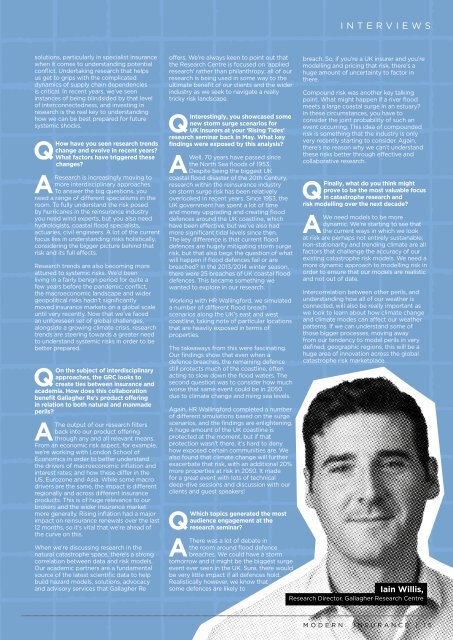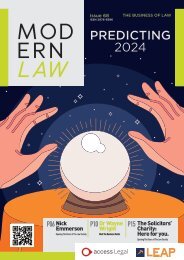Modern Insurance Magazine Issue 60
This issue features... Insight: Every Cloud Has A Silver Lining, by Tim Yeates, Co-Founder, Carbon1 Ltd. Interview: Modelling Modern Risk with Dr Kirsten Mitchell-Wallace, Director of Portfolio Risk Management, Lloyd’s of London Interview: Searching for Answers with Iain Willis, Research Director, Gallagher Research Centre Editorial Board: Find out what our editorial board panel of experts have to say in this edition of Modern Insurance Magazine A Final Word with Steve White, Chief Executive, British Insurance Brokers' Association (BIBA) Is it time for Risk Managers to rethink their role in the Climate Crisis? by François Lanavère, Head of Strategic Partnerships, AXA Climate Associations Assemble: Modern Insurance’s panel of resident associations outline the burning issues in insurance Just a Thought with Eddie Longworth - Building Trust through Responsible AI in Claims: Championing a Voluntary Code of Conduct Making Efficiency Gains in Subsidence Claims, by Chris Carlton MRICS, New Business & Key Account Director, Geobear Chemistry for a Sustainable Future: Q&A with Grant Dempsey, Sales Manager - Distribution, BASF Automotive Refinish UK & Ireland Industry Collaboration: Working together to provide the best mobility solution, with James Roberts, Business Development Director, Insurance, Europcar Mobility Group UK Thinking Upside Down: Mind the Protection Gap, by Ashley Preece, Product Owner, Claim Technology In Conversation with… Neil Garrett, UK, South Africa & Nordics Sales Director, Solera | Audatex A New Climate for Claims, from I Love Claims / ARC 360 10 Mins with… Ola Jacob, Independent Insurance Advisor In Celebration: Modern Claims Awards 2023 Insur.Tech.Talk - Interviews with Stephen Weinstein, Former Chair of the Bermuda Business Development Agency; Bill Churney, President, Extreme Event Solutions, Verisk; Jacqui LeGrand, CEO, Maptycs; Heather H. Wilson, Chief Executive Officer, CLARA Analytics Insur.Tech.Talk Editorial Board - Experts from within the insurtech sector and beyond join us once more to share their unique insights!
This issue features...
Insight: Every Cloud Has A Silver Lining, by Tim Yeates, Co-Founder, Carbon1 Ltd.
Interview: Modelling Modern Risk with Dr Kirsten Mitchell-Wallace, Director of Portfolio Risk Management, Lloyd’s of London
Interview: Searching for Answers with Iain Willis, Research Director, Gallagher Research Centre
Editorial Board: Find out what our editorial board panel of experts have to say in this edition of Modern Insurance Magazine
A Final Word with Steve White, Chief Executive, British Insurance Brokers' Association (BIBA)
Is it time for Risk Managers to rethink their role in the Climate Crisis? by François Lanavère, Head of Strategic Partnerships, AXA Climate
Associations Assemble: Modern Insurance’s panel of resident associations outline the burning issues in insurance
Just a Thought with Eddie Longworth - Building Trust through Responsible AI in Claims: Championing a Voluntary Code of Conduct
Making Efficiency Gains in Subsidence Claims, by Chris Carlton MRICS, New Business & Key Account Director, Geobear
Chemistry for a Sustainable Future: Q&A with Grant Dempsey, Sales Manager - Distribution, BASF Automotive Refinish UK & Ireland
Industry Collaboration: Working together to provide the best mobility solution, with James Roberts, Business Development Director, Insurance, Europcar Mobility Group UK
Thinking Upside Down: Mind the Protection Gap, by Ashley Preece, Product Owner, Claim Technology
In Conversation with… Neil Garrett, UK, South Africa & Nordics Sales Director, Solera | Audatex
A New Climate for Claims, from I Love Claims / ARC 360
10 Mins with… Ola Jacob, Independent Insurance Advisor
In Celebration: Modern Claims Awards 2023
Insur.Tech.Talk - Interviews with Stephen Weinstein, Former Chair of the Bermuda Business Development Agency; Bill Churney, President, Extreme Event Solutions, Verisk; Jacqui LeGrand, CEO, Maptycs; Heather H. Wilson, Chief Executive Officer, CLARA Analytics
Insur.Tech.Talk Editorial Board - Experts from within the insurtech sector and beyond join us once more to share their unique insights!
You also want an ePaper? Increase the reach of your titles
YUMPU automatically turns print PDFs into web optimized ePapers that Google loves.
INTERVIEWS<br />
solutions, particularly in specialist insurance<br />
when it comes to understanding potential<br />
conflict. Undertaking research that helps<br />
us get to grips with the complicated<br />
dynamics of supply chain dependencies<br />
is critical. In recent years, we’ve seen<br />
instances of being blindsided by that level<br />
of interconnectedness, and investing in<br />
research is the real key to understanding<br />
how we can be best prepared for future<br />
systemic shocks.<br />
Q<br />
A<br />
How have you seen research trends<br />
change and evolve in recent years?<br />
What factors have triggered these<br />
changes?<br />
Research is increasingly moving to<br />
more interdisciplinary approaches.<br />
To answer the big questions, you<br />
need a range of different specialisms in the<br />
room. To fully understand the risk posed<br />
by hurricanes in the reinsurance industry<br />
you need wind experts, but you also need<br />
hydrologists, coastal flood specialists,<br />
actuaries, civil engineers. A lot of the current<br />
focus lies in understanding risks holistically,<br />
considering the bigger picture behind that<br />
risk and its full effects.<br />
Research trends are also becoming more<br />
attuned to systemic risks. We’d been<br />
living in a fairly benign period for quite a<br />
few years before the pandemic; conflict,<br />
the macroeconomic landscape and wider<br />
geopolitical risks hadn’t significantly<br />
moved insurance markets on a global scale<br />
until very recently. Now that we’ve faced<br />
an unforeseen set of global challenges,<br />
alongside a growing climate crisis, research<br />
trends are steering towards a greater need<br />
to understand systemic risks in order to be<br />
better prepared.<br />
Q<br />
On the subject of interdisciplinary<br />
approaches, the GRC looks to<br />
create ties between insurance and<br />
academia. How does this collaboration<br />
benefit Gallagher Re’s product offering<br />
in relation to both natural and manmade<br />
perils?<br />
The output of our research filters<br />
back into our product offering<br />
A through any and all relevant means.<br />
From an economic risk aspect, for example,<br />
we’re working with London School of<br />
Economics in order to better understand<br />
the drivers of macroeconomic inflation and<br />
interest rates; and how these differ in the<br />
US, Eurozone and Asia. While some macro<br />
drivers are the same, the impact is different<br />
regionally and across different insurance<br />
products. This is of huge relevance to our<br />
brokers and the wider insurance market<br />
more generally. Rising inflation had a major<br />
impact on reinsurance renewals over the last<br />
12 months, so it’s vital that we’re ahead of<br />
the curve on this.<br />
When we’re discussing research in the<br />
natural catastrophe space, there’s a strong<br />
correlation between data and risk models.<br />
Our academic partners are a fundamental<br />
source of the latest scientific data to help<br />
build hazard models, solutions, advocacy<br />
and advisory services that Gallagher Re<br />
offers. We’re always keen to point out that<br />
the Research Centre is focused on ‘applied<br />
research’ rather than philanthropy; all of our<br />
research is being used in some way to the<br />
ultimate benefit of our clients and the wider<br />
industry as we seek to navigate a really<br />
tricky risk landscape.<br />
Q<br />
Interestingly, you showcased some<br />
new storm surge scenarios for<br />
UK insurers at your ‘Rising Tides’<br />
research seminar back in May. What key<br />
findings were exposed by this analysis?<br />
A<br />
Well, 70 years have passed since<br />
the North Sea floods of 1953.<br />
Despite being the biggest UK<br />
coastal flood disaster of the 20th Century,<br />
research within the reinsurance industry<br />
on storm surge risk has been relatively<br />
overlooked in recent years. Since 1953, the<br />
UK government has spent a lot of time<br />
and money upgrading and creating flood<br />
defences around the UK coastline, which<br />
have been effective, but we’ve also had<br />
more significant tidal levels since then.<br />
The key difference is that current flood<br />
defences are hugely mitigating storm surge<br />
risk, but that also begs the question of what<br />
will happen if flood defences fail or are<br />
breached? In the 2013/2014 winter season,<br />
there were 25 breaches of UK coastal flood<br />
defences. This became something we<br />
wanted to explore in our research.<br />
Working with HR Wallingford, we simulated<br />
a number of different flood breach<br />
scenarios along the UK’s east and west<br />
coastline, taking note of particular locations<br />
that are heavily exposed in terms of<br />
properties.<br />
The takeaways from this were fascinating.<br />
Our findings show that even when a<br />
defence breaches, the remaining defence<br />
still protects much of the coastline, often<br />
acting to slow down the flood waters. The<br />
second question was to consider how much<br />
worse that same event could be in 2050<br />
due to climate change and rising sea levels.<br />
Again, HR Wallingford completed a number<br />
of different simulations based on the surge<br />
scenarios, and the findings are enlightening.<br />
A huge amount of the UK coastline is<br />
protected at the moment, but if that<br />
protection wasn’t there, it’s hard to deny<br />
how exposed certain communities are. We<br />
also found that climate change will further<br />
exacerbate that risk, with an additional 20%<br />
more properties at risk in 2050. It made<br />
for a great event with lots of technical<br />
deep-dive sessions and discussion with our<br />
clients and guest speakers!<br />
Q<br />
Which topics generated the most<br />
audience engagement at the<br />
research seminar?<br />
There was a lot of debate in<br />
the room around flood defence<br />
A breaches. We could have a storm<br />
tomorrow and it might be the biggest surge<br />
event ever seen in the UK. Sure, there would<br />
be very little impact if all defences hold.<br />
Realistically however, we know that<br />
some defences are likely to<br />
breach. So, if you’re a UK insurer and you’re<br />
modelling and pricing that risk, there’s a<br />
huge amount of uncertainty to factor in<br />
there.<br />
Compound risk was another key talking<br />
point. What might happen if a river flood<br />
meets a large coastal surge in an estuary?<br />
In these circumstances, you have to<br />
consider the joint probability of such an<br />
event occurring. This idea of compounded<br />
risk is something that the industry is only<br />
very recently starting to consider. Again,<br />
there’s no reason why we can’t understand<br />
these risks better through effective and<br />
collaborative research.<br />
Q<br />
Finally, what do you think might<br />
prove to be the most valuable focus<br />
in catastrophe research and<br />
risk modelling over the next decade?<br />
We need models to be more<br />
dynamic. We’re starting to see that<br />
A the current ways in which we look<br />
at risk are perhaps not entirely sustainable;<br />
non-stationarity and trending climate are all<br />
factors that challenge the accuracy of our<br />
existing catastrophe risk models. We need a<br />
more dynamic approach to modelling risk in<br />
order to ensure that our models are realistic<br />
and not out of date.<br />
Intercorrelation between other perils, and<br />
understanding how all of our weather is<br />
connected, will also be really important as<br />
we look to learn about how climate change<br />
and climate modes can affect our weather<br />
patterns. If we can understand some of<br />
those bigger processes, moving away<br />
from our tendency to model perils in very<br />
defined, geographic regions, this will be a<br />
huge area of innovation across the global<br />
catastrophe risk marketplace.<br />
MODERN INSURANCE | 15

















